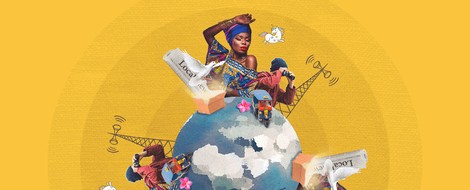Your podcast discovery platform
Curious minds select the most fascinating podcasts from around the world. Discover hand-piqd audio recommendations on your favorite topics.

piqer for: Global finds
Ciku Kimeria is a Kenyan author "Of goats and poisoned oranges" - (https://www.amazon.com/goats-poisoned-oranges-Ciku-Kimeria-ebook/dp/B00HBBWPI6), development consultant, adventurer and travel blogger (www.thekenyanexplorer.com). She writes both fiction and non-fiction focusing on African stories that need telling. She has worked on diverse pieces for various international and local publications including Quartz, Ozy, The East African etc. She has travelled to 45 countries – 16 of them in Africa. 153 countries to go and 63 territories!
"Of goats and poisoned oranges" has been extremely well received in Kenya and beyond. It tells the story of a Kenyan middle aged power couple and their complicated marriage. The novel explores issues of greed, revenge, betrayal and murder. It runs from the 1960s to 2013. It has been described as “Wicked, funny, poignant, wacky, human, a big ball of fun and danger”, “A unique and captivating book”, “Fun and intriguing”, “Impossible to put down once you start reading.”
She recently moved to Dakar, Senegal from Kenya to work on her second novel. She also works at as the Africa Communication Manager at a leading global strategy consulting firm.
She holds a B.S. in Management Science from MIT with minors in Urban Planning and International development studies.
Video: China's Soft Power In Kenya
Following up from a previous podcast I had recommended a few weeks back on whether Africa is borrowing too much from China, I came across this interesting Quartz News video looking at how China's soft power is working in Kenya. The overwhelming message from the video is that China's soft power is not really that soft and is considered to be a mix of propaganda and government-to-government deals that the average Kenyan is skeptical about.
In Kenya, China is everywhere. And with Mandarin schools and massive infrastructure projects, China's trying to grow its "soft power" throughout Africa. But can China convince Africans to love it?
Anzetse Were, a Kenyan development economist, says that one of the things that has enhanced China's soft power in Africa is the fact that they didn't come with any prescriptive notions of what development in Africa should look like [as compared to their Western counterparts.] They also did not come with any colonial baggage.
However, the fact that most of China's activities in Africa – including cultural ones that are government sponsored – do little to endear China to Kenyans. Soft power is not meant to follow a top down approach. The interviewer talks about the mismatch between the soft power China is trying to have on the continent and their general approach.
Soft power is about getting what you want without soldiers or sanctions....Soft power is about convincing other countries to want the same things you do. One of the best examples is the US wanting people to learn English, to watch Hollywood movies and to go to Harvard...and everyone else wants those things too.
Towards the end of the video, we get to understand one of the key challenges in interactions between Chinese and Kenyans. Person to person exchanges are at a minimum. As such, Kenyans find it very hard to differentiate between the Chinese and their government. Until this can be addressed, such interactions will always be fraught with mistrust.
